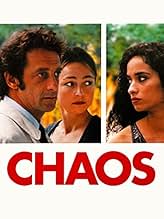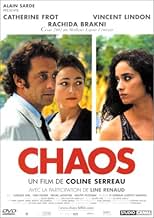Chaos
- 2001
- 1h 49m
One night by accident, a young prostitute barges into the lives of a bourgeois, modern-but-conventional couple. Hounded down, beaten up, threatened, she will continue to struggle, with the h... Read allOne night by accident, a young prostitute barges into the lives of a bourgeois, modern-but-conventional couple. Hounded down, beaten up, threatened, she will continue to struggle, with the help of a well-off lady, first for her survival--her resurrection--then for her dignity and... Read allOne night by accident, a young prostitute barges into the lives of a bourgeois, modern-but-conventional couple. Hounded down, beaten up, threatened, she will continue to struggle, with the help of a well-off lady, first for her survival--her resurrection--then for her dignity and freedom. Stormy encounters are forecast for everyone involved.
































